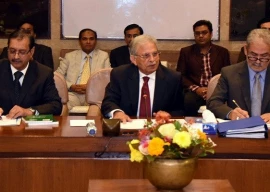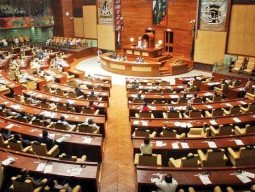
Half of Karachi’s journalists were diagnosed with anxiety, while more men sought counseling sessions than women. This was revealed by a study based on data collected by the Centre for Excellence in Journalism (CEJ) over the last three years.
“This issue is not going anywhere,” said CEJ Director and Senior Journalist Kamal Siddiqi. “I think the challenges are mounting for journalists. The pressures are mounting. The stresses are mounting. It has nothing to do with young or old or your medium of work,” he said
“In our profession, when people reach breaking point, they ask for help. I think it’s time we started looking at signs, whether in our selves or colleagues so we can get help prior to that.”
A free confidential counseling service for media workers was launched in 2018 in collaboration with DW Akademie. Its four clinical psychologists, Dr Asha Bedar, Mahnoor Shaikh, Tabinda Afzal and Zainab Barry, provided over 600 hourly counseling sessions to 107 journalists across Pakistan, with the majority in Karachi.
This study brings together insights from the journalist clients, data from surveys after wellbeing workshops, and multiple interviews with newsroom managers.
“We wanted to provide a snapshot, a real understanding [of the impact on their work and on them individually],” said Dr Asha, referring to the stresses journalists faced.
The findings show that the majority of journalists tended to come for two to seven sessions. The biggest group was in the 21-30 year age bracket. Half of the journalists from Karachi were diagnosed with anxiety. It shows that more men sought counseling than women.
Read More: Sindh Assembly unanimously passes journalists protection law
After factoring in overlap, a majority of clients were working in digital or online capacities. An overwhelming majority of journalist clients were working full-time. Thirty seven out of the 90 journalists in Karachi, who came for varying degrees of counseling at the Wellbeing Centre, had been on the job from one to five years. The subeditors, reporters and newsroom managers mostly sought help, but so did anchors
“Establishing trust was a major part of running this service successfully,” said Dr Asha Bedar. “A lot of thought went into ensuring it; for example, managing the clinic’s space so that journalists would not bump into each other while coming and going for appointments.
In a live facebook session about the study with Siddiqi, Dr Asha recalled how she would take a few sessions with journalist clients to establish trust. She understood that just because she had a degree, did not mean someone who was struggling would automatically trust her.
Published in The Express Tribune, September 23rd, 2021.

1732071267-0/lana-(2)1732071267-0-405x300.webp)
1727242355-0/Diddy-(1)1727242355-0-165x106.webp)

1732063440-0/elon-(3)1732063440-0-165x106.webp)
















COMMENTS
Comments are moderated and generally will be posted if they are on-topic and not abusive.
For more information, please see our Comments FAQ